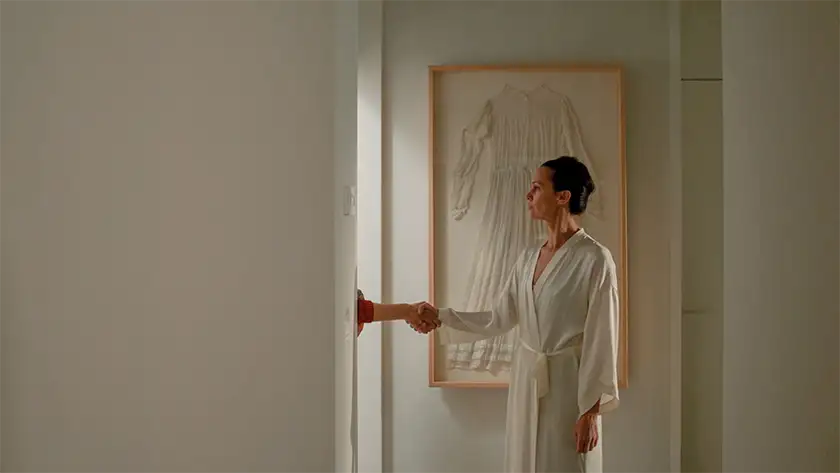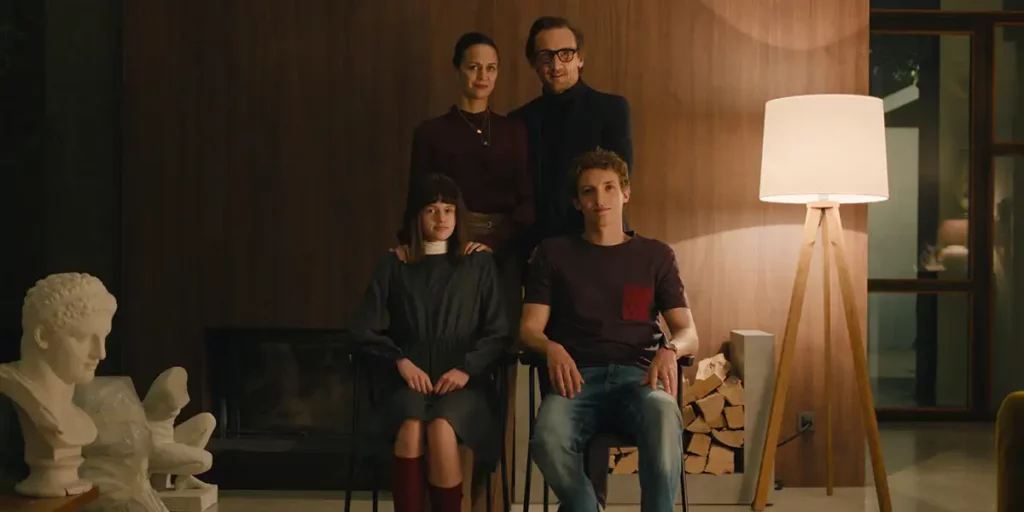Yorgos Lanthimos meets Bong Joon Ho in Family Therapy, a twisted satire about an ultra rich, “perfect” family who welcomes a stranger into their glass home.
Director: Sonja Prosenc
Genre: Comedy / Drama
Run Time: 122′
Tribeca Premiere: June 8-14, 2024
Release Date: TBA
Why do the rich seem to have a different set of morals from the rest of us? Why do the wealthy not teach the same lessons about human decency to their children as the general public does? Why do those who seem to have it all not concern themselves with the people in their very own community who have virtually nothing?
These questions are at the center of Sonja Prosenc’s newest film Family Therapy, a fascinating satire analyzing the behavior and rationale of the ultra rich.
Family Therapy opens on a nouveau rich family consisting of a father, Aleksander (Marko Mandic), a mother, Olivia (Katarina Stegnar), and their daughter, Agata (Mila Bezjak), picking up a “stranger” from the airport. The three family members have a polite, sterile relationship with one another. We come to find out that the “stranger” in question is Julien (Aliocha Schneider), Aleksander’s 25 year-old estranged son from a previous relationship. It is clear Olivia and Agata want nothing to do with Julien and do not understand why he was invited by Aleksander.
On the drive to the family home, they pass a couple with a young child on the side of the road standing next to a car that has caught fire. Rather than stop and help the young family, Aleksander continues to drive off in his luxury car and listen to a radio host discussing the ways which class divides communities, much to Julien’s horror.
When the family reaches their lavish glass house, it becomes clear not even Julien understands why Aleksander asked him to come here and spend time with the family that already feels disjointed. Agata takes an interest in her step-brother, but Olivia refuses to engage with him. We soon learn the reasoning for Julien’s presence is because Aleksander needed a fourth family member in order to apply for a once in a lifetime opportunity to take the “perfect family on a perfect trip” to space. As Julien becomes enveloped into this strange new world and this distant family, everyone’s lives to quickly spin out of control as his presence exposes the cracks within their dynamic.

Prosenc’s central conflict within the story is that Aleksander is desperately trying to make this group of four people out to be a “perfect” family, but it is not Julien’s presence alone that bars them from earning this title. They were broken long before this win-a-trip-to-space plan Aleksander set his eyes on. Olivia is deeply unhappy in her marriage, which translates to her being very critical of her husband and wildly unfriendly to anyone she may come in contact with. Agata, after getting over a severe case of leukemia, is still trapped living in a bubble her parents have built to keep her safe. Aleksander quit his highly profitable job in hospitality to commit more time to being a writer, but hasn’t written following his last piece that was a success 20 years ago. To put it plainly, no one is happy and no one has been happy for a while.
While at first you may think Aleksander wants to win this trip because going to space seems like the type of insane thing a rich person would be aching to do, you realize there is a deeper desire that Aleksander is trying to satiated. This trip is marketed as a “perfect trip for a perfect family” and Aleksander thinks that, if he can win this trip for his family, then it means his family really is perfect. He thinks that, if he can get this bizarrely convoluted sense of affirmation, then it would mean he is a good father. It would cancel out the lack of contact he’s had with Julien and the fact he never made an effort to make him a part of the family before. It would give Agata a sense of her childhood back that she lost to her illness. It would even fix the marital woes going on between him and Olivia.
While initially Aleksander seems like an extraordinarily surface-level character his progression throughout the film, specifically as he seeks reassurance in his ability to parent, is incredibly rich and well developed. The way Prosenc has written him makes you begin to pity him even before you understand the deeper motivation behind his antics and eventually grow fond of him. Marko Mandic gives a jawdropping, brilliant performance as the patriarch desperate to make amends with his family but unable to be vulnerable with them.
One of the central questions of the film is: why did they not stop to help the family who stood beside their burning car? While Prosenc doesn’t come out and blatantly say it, the rest of the movie aims to give the answer that, simply put, they can’t see beyond themselves. When the family arrives at their house after picking up Julien from the airport, we see it is a literal glass house they live in. While the metaphor seems pretty on-the-nose initially, it grows into a meaningful point of the plot. They can afford to live in this giant glass house but their money has blinded their ability to see beyond themselves.
As tensions rise, the glass walls begin to crack, threatening to not only break the barrier between this family and the real world and real issues beyond them, but also the emotional barriers everyone in the house seems to have up as well. The glass chips throughout the film, getting into the skin of family members and marking the softness emerging in each one of them.
Family Therapy is a story about class, family, and above all else, redemption. This family’s money has damned them to a life of disconnection and an inability to feel compassion in a normal way. Julien brings the color back into their lives, potentially even being the one to introduce it to them for the first time. He fights to show them they need to care about things outside of themselves and a perfect example was that they should have helped the family whose car was on fire. He did not grow up with the luxuries his estranged family has, and it’s only through having his perspective present they are able to break in order to grow. Prosenc’s storytelling in general sneaks up on you as a viewer. Its oddities are reminiscent of the type of worlds Yorgos Lanthimos builds, but her storytelling is much more accessible, albeit mature.
There has not been a film dealing with family and class divide this well done since Bong Joon Ho’s 2019 Parasite. Writer-Director Sonja Prosenc’s movie artfully unmasks the ugly world of the excessively wealthy in an incredibly beautiful way. Her filmmaking favors utlizing the mise-en-scene to show audience members the intricacies of wealth politics rather than using dialogue to blatantly explain it. She challenges viewers to dissect and debate her film the same way one would dissect a painting. Her story telling is artful and intentional and she doesn’t let a single frame of the movie go to waste. Her writing and directorial style are endlessly fascinating, leaving audiences yearning for more.
Family Therapy had its World Premiere at the Tribeca Film Festival on June 8-14, 2024. Read our reviews of the Dolly De Leon-starring Triangle of Sadness, Between The Temples, Ghostlight, and Jackpot!

